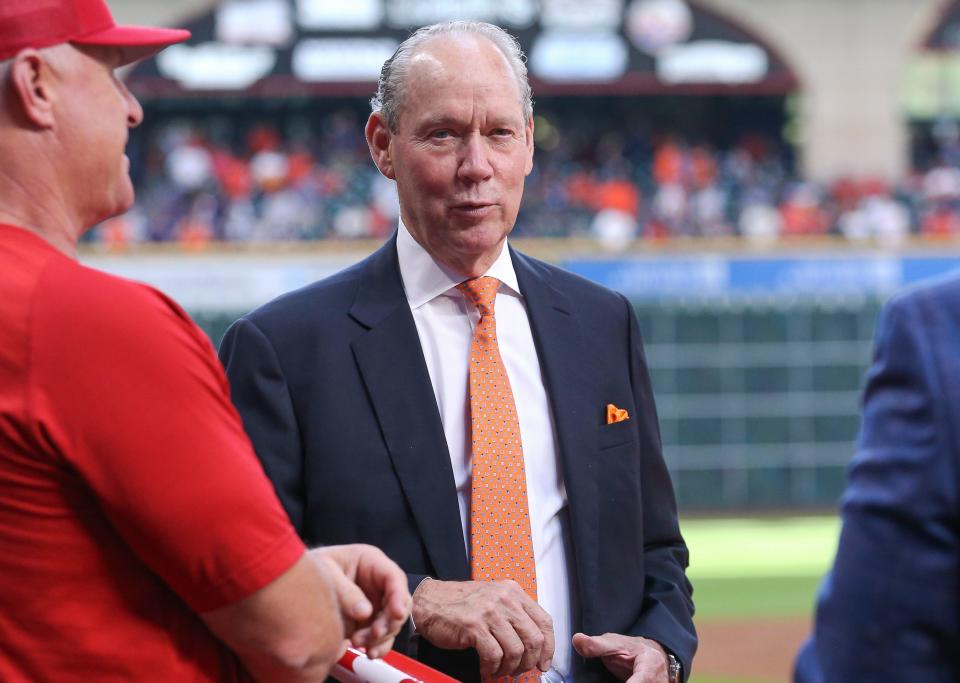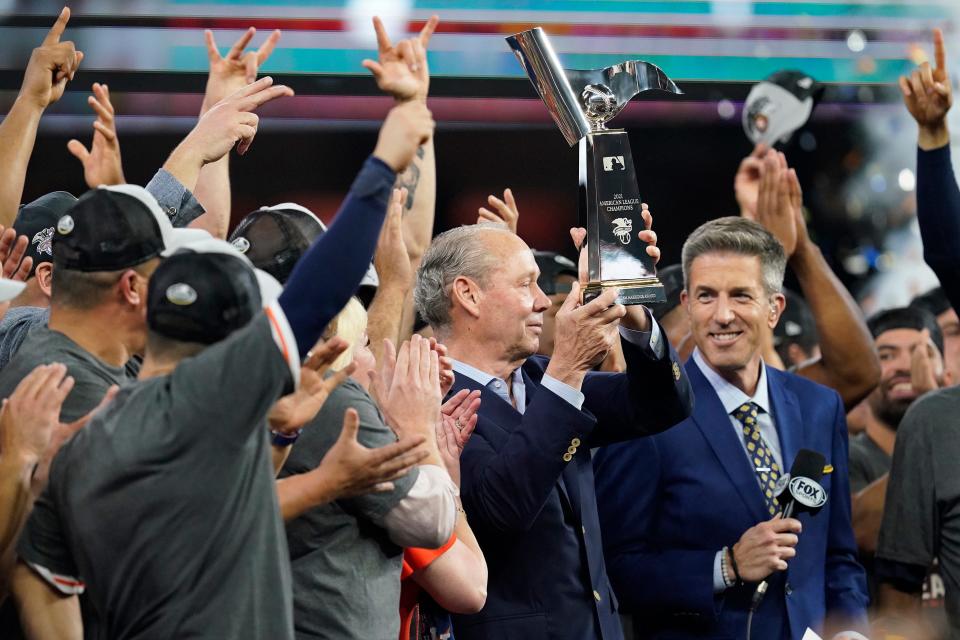As Astros continue to thrive, owner Jim Crane has advice for other cheaters: 'I'd keep my mouth shut'
HOUSTON — The team that America loves to hate, boo, taunt and curse wherever they travel, is once again flaunting its virtues in front of the baseball world.
The Houston Astros continue to win, putting together a glorious run not seen in the American League since the New York Yankees’ dynasty two decades ago.
You can hate them all you want, cringe at their line of defense and disapprove of their incredulity towards New York Yankees GM Brian Cashman (“Dude, you were there’’), but facts are facts.
The Astros have reached the World Series three times in the past five years, winning the championship in 2017. They are only the second team in history to advance to the American League Championship Series five consecutive years.
Now, even the All-Star shortstop Carlos Correa’s departure, the Astros entered the week on an MLB-leading eight-game winning streak, 19-11, one game behind the Los Angeles Angels. They still remain the favorites to win the AL West for the fifth time in six years..
MLB ATTENDANCE: The good (Blue Jays), bad (Yankees) and downright ugly (A's)
JEREMY PEÑA JR.: Astros' new shortstop looks like he belongs
“It’s been a good run, we’ve done pretty well,’’ Astros owner Jim Crane told USA TODAY Sports during a game from his Minute Maid Park suite last week, “but I’d sure like to get a few more gold flags up there instead of orange ones.’’
Crane, who 10 years ago, purchased the Astros for $680 million, which has since soared to nearly $2 billion, is pointing out the signage in left field signifying the Astros’ successes. The orange flags commemorate their pennants, and the gold one their lone World Series title.
It’s that gold flag, of course, that still has opposing fans, players, executives and historians livid.
This was the year the Astros were cheating, caught illegally using electronic monitors to relay signs to the hitters, including banging on a trash can in the dugout hallway.
The espionage cost general manager Jeff Luhnow and manager A.J. Hinch their jobs in Houston, manager Alex Cora his job for one season in Boston, and Carlos Beltran his job with the New York Mets before he managed a single game.
The Astros were fined $5 million, forfeited their first- and second-round draft picks in 2020-2021, and caused damage to the organization’s reputation.
Well, here we are five years later. Hinch (Detroit Tigers) and Cora (Red Sox) are managing again, Beltran is working as an analyst for the Yankees’ YES Network and the Astros keep on winning but folks still refuse to forgive and forget.

The hypocrisy is that the Astros hardly were the only ones cheating. Players like Chris Sale of the Boston Red Sox believe that perhaps a numberof teams were illegally using electronic signals. And a previously sealed letter from commissioner Rob Manfred revealed that the Yankees were using the replay review room and dugout phone to decode signs in 2015-2016, and fined $100,000. The Red Sox were also penalized for using Apple Watches to steal and communicate signs.
“I think there was a bigger problem out there, but we caught the brunt of it,’’ Crane says. “We did what we did. We took our punishment. People want somebody to get after it, and we’re it.
“Part of it is because we’re been successful and beaten a lot of teams, but we got caught doing the wrong thing. We paid the price, probably a lot more than anybody else who might have also been doing it.
“The thing that’s upsetting is the behavior in some stadiums where people are cussing and throwing things. You wear an Astros jersey at some of these places, and you can get into a fracas pretty quick. That’s bad for baseball.’’
Crane isn’t confining his frustration to the opposing fanbase, either, with Cashman insisting that only the Astros’ cheating scandal prevented them from winning the World Series when they lost to them during the ALCS in 2017.
“The only thing that stopped [us] was something that was so illegal and horrific,’’ Cashman told The Athletic before the start of the season. “So, I get offended when I start hearing we haven’t been to the World Series since ’09. Because I’m like, 'Well, I think we actually did it the right way.'
One month later, the letter from Manfred to the Yankees was unsealed, revealing that they cheated, too, only the illegal activity wasn’t as sophisticated as the Astros’ sign stealing.
“I found his comments to be extremely strange,’’ Crane said. “There’s the letter, and you were doing it, too. You were there dude. What are you talking about?
“If I was one of the teams, and I knew our team was doing it [cheating], I’d keep my mouth shut and just go about our business. But listen, I can only control what’s going on here. I can’t control what the other guys do.’’
Crane isn’t looking for praise from his colleagues, or commendations from the commissioner’s office, but the Astros have quietly become a model franchise.
“When we got in, this place was a mess,’’ Crane said. “The revenues weren’t great. We weren’t drawing. The corporate sponsors weren’t there. We improved everything in here. I set a standard of what we expect. If something is not right here, we’re on top of it.’’
The Astros now have the most diverse baseball operations department in MLB, with 55% of its staff classified as non-white, according to MLB’s recent survey. Crane, who hired Dusty Baker two years ago, is the only baseball owner who has ever hired two Black managers. They are averaging 32,514 fans – second-largest in the American League – and with a 17,500 season-ticket base are projected to draw 2.5-2.6 million fans this year.
“I think we’ve got one of the top five franchises in the business, if not higher,’’ Crane says. “We’ve taken advantage of what we have here for sure.’’
Crane talks about the change in downtown, with condos and apartments replacing vacant buildings and homes. They plan to build a hotel and have their own entertainment village “becoming more Chicago-esque than it ever has been in the past.’’
Still, nothing creates fan interest and profitability more than winning, and as long as the Astros keep winning, and the fans show up, Crane vows to keep spending.
“This town has fallen in love with the winning,’’ said Crane, who has nearly doubled the payroll since he purchased the team. “We built the loyalty, but you got to win. You’ve got to be relevant. When you draw well, the revenues go up, you can afford to pay the players more.’’

The Astros, who have had a payroll nearing the luxury tax during their championship run, have $210 million committed with room for maneuverability this summer. They would have eclipsed the $230 million luxury tax by re-signing Correa, one of the franchise’s core pieces.
They offered Correa a five-year, $160 million contract, Crane said, which was less than half of what free-agent shortstop Corey Seager received from the Texas Rangers. Simply, they stuck to their philosophy of not signing any player to a deal longer than five years. Even if the Astros increased their final offer, Crane said, they refused to give Correa an opt-out clause like the Twins did in their three-year, $105.3 million contract.
“Everyone wanted him back,’’ Crane said. “We said we would consider a deal, not at the number they wanted, but they wanted an opt-out. I said you can’t build a team like that. [GM James] Click doesn’t believe you can build with the uncertainty that the guy can be gone. You have to make a decision. So that was kind of a deal-breaker for us. …
“We will the spend money for the players when we’re constructing a team, and do what’s best for the team, but we can’t do it for one individual, no matter how good they are.’’
The Astros would have also gone over the luxury tax threshold by re-signing Correa, which can incur costly draft pick penalties instead of simple financial losses.
“Listen, you’ve got to run a roster,’’ Crane said. “If you add $35 million to your roster, you’re over the luxury tax, and you’re over it again the next year and year after that. It gets more expensive and you can’t make a lot of improvements. I know some are doing things way over [the luxury tax], but that’s not sustainable.
“We will make a move to win, but the real problem of being over [the tax] is that the loss of draft picks will kill you. We just feel the draft picks are too valuable.’’
The Astros did spend $50 million to bring back former Cy Young winner Justin Verlander, who is guaranteed $25 million this year with another $25 million on an option that automatically vests if he pitches at least 130 innings. Crane personally got involved when talks stalled and Verlander was close to leaving after undergoing Tommy John surgery and making just one start over the past two years.
“I helped get him here, and I tried to keep him here,’’ said Crane, who had insurance on Verlander’s previous two-year, $66 million extension. “He likes the city. He wanted to come back. I just said, 'Hey, what’s it going to take?’ We got to the number and we were good.’’
Verlander, 39, has been stellar since his return, coming within five outs of his fourth-career no-hitter Tuesday, and is now 4-1 with a 1.55 ERA, striking out 36 batters with just six walks.“A guy that’s pitching at the age of 39, especially with the way he’s pitching is pretty impressive,’’ Crane said, “He said he kind of re-toned his whole body, and had these guys working on him that kind of reset his muscles. It’s kind of crazy ... Maybe I need to try it.’’
And now that there are only a few players left on the Astros from the cheating scandal maybe the animosity towards the team will even subside?
The hatred is grossly unfair, he says, towards All-Star second baseman Jose Altuve. He was one of the few players who refused to participate in the scheme.
“He was one of the few guys that didn’t want to deal with it,’’ Crane said. “He said, 'I can just hit the ball, leave me alone.’
“It’s just not right the way they treat him. The tension in some of these places, they get out of whack pretty quick.’’
In time, maybe it will be like the steroid era. You may be happy they were kept out of the Hall of Fame, but should they really be punished more than anyone else in an era powered by performance-enhancing drugs?
Perhaps, we may ask ourselves the same of the Astros. Sure, they cheated, but were hardly the only ones. It’s just that no one else has had their sustained greatness.
“It’s unfortunate,’’ Crane said, “but it’s over now. It won’t happen again.’’
This article originally appeared on USA TODAY: Astros' Jim Crane has advice for Yankees, other MLB cheaters

